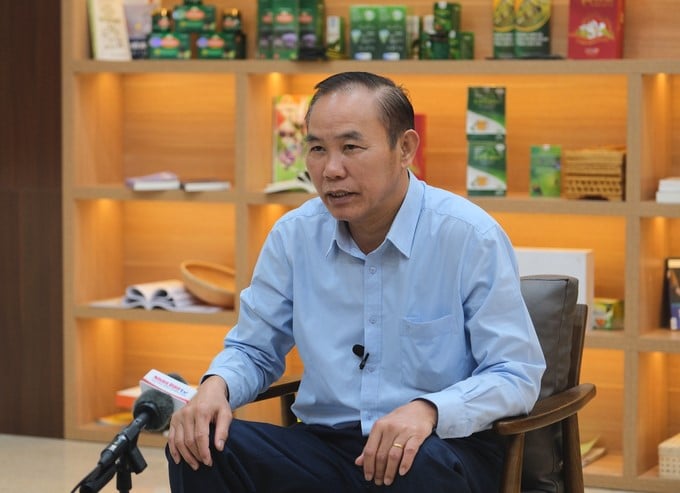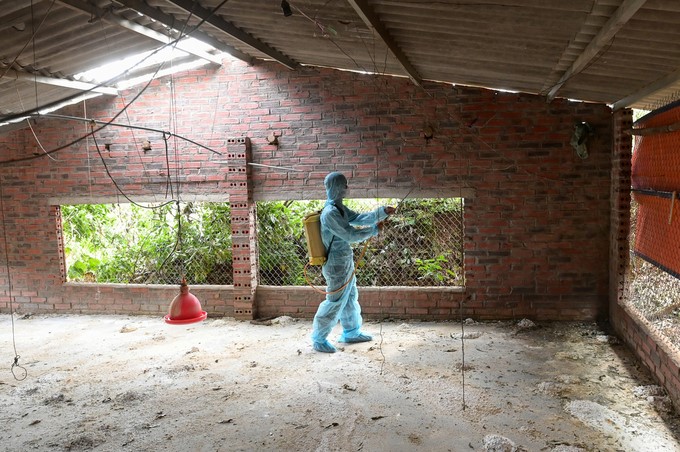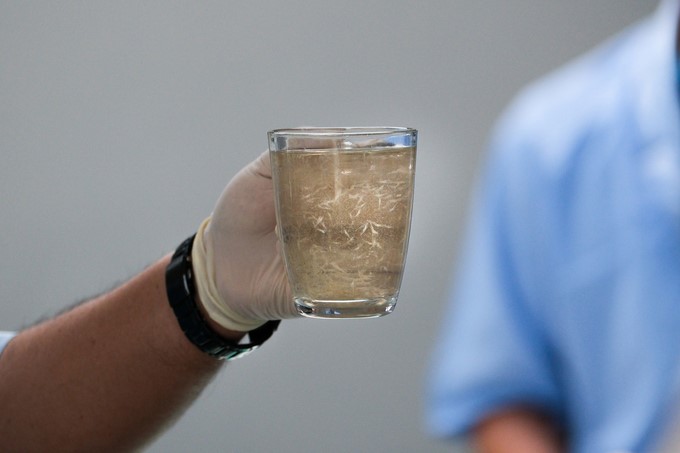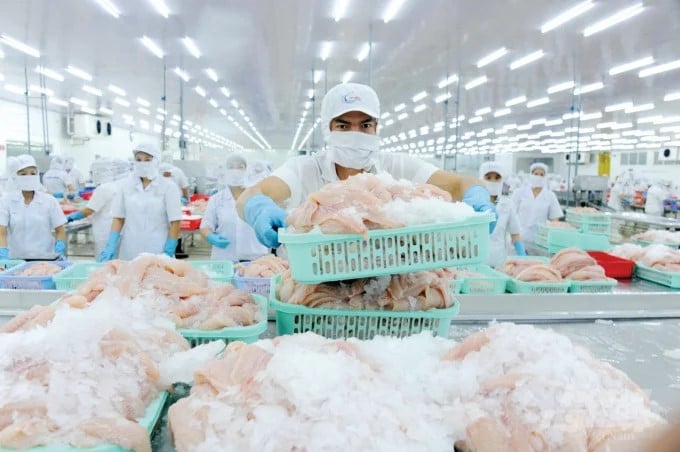June 18, 2025 | 19:50 GMT +7
June 18, 2025 | 19:50 GMT +7
Hotline: 0913.378.918
June 18, 2025 | 19:50 GMT +7
Hotline: 0913.378.918

Deputy Minister of Agriculture and Rural Development Phung Duc Tien talked to the press about the situation of agro-forestry-fishery product exports in the first 9 months of the year. Photo: Quynh Chi.
According to the Ministry of Agriculture and Rural Development (MARD), in the first 9 months of 2024, the production value of the entire agricultural sector increased by more than 3%. Regarding exports, in September, the export turnover of agricultural, forestry, and fishery products reached 5.85 billion USD, up 31% over the same period in 2023. In the first 9 months of the year, the export turnover of the entire industry reached 46.28 billion USD, up 21%.
Sharing information with the press on October 4, Deputy Minister of Agriculture and Rural Development Phung Duc Tien emphasized that although Typhoon No. 3 caused more or less damage to the entire agricultural sector, the scale of impact was only within the Northern provinces, so key export areas in the Central and Southern regions still ensure growth rate.
Regarding damage recovery, based on the actual situation, MARD has issued guiding documents on environmental treatment and disease prevention; organized conferences on production recovery for each field of forestry, crop production, livestock production, and fisheries, with the capital support from businesses, cooperatives, and organizations.
"MARD has selected key plant and animal varieties that can immediately promote their value. These subjects have a stable market and an appropriate season to focus on development and damage recovery," affirmed Deputy Minister Phung Duc Tien.
When directives and solutions are seriously implemented, the agricultural sector will soon overcome damage and stabilize people's lives. The last 3 months of the year are a favorable time for the entire industry to continue to maintain growth momentum in the production and export of agricultural products.

Agricultural specialized agencies actively support livestock farmers to clean and disinfect barns to soon restock their herds. Photo: Tung Dinh.
In the first 9 months of 2024, the country's total live meat output reached over 6 million tons, up nearly 5% over the same period last year. But meat imports also reach more than 1 billion USD.
Regarding this content, Deputy Minister Phung Duc Tien said that Vietnam is in the context of integration and opening of international markets to promote development and update new technologies.
"With a scale of more than 33 billion USD, the livestock industry contributes 26% to agricultural GDP and over 5% of our country's GDP. However, if the growth momentum of the livestock sector is not maintained, the agricultural sector will find it difficult to achieve the expected growth rate," the Deputy Minister noted.
Therefore, in recent times, MARD has focused on three key solutions to maintain the livestock industry's growth rate. First, focus on exporting to high-quality market segments. Notably, chicken meat products will be exported to the potential Halal market with large consumption power.
Second, strengthen the prevention and control of poultry smuggling in the North and pig smuggling in the South to maintain the scale and growth rate of cattle and poultry herds.
Finally, review import activities, following the criteria associated with the Law on Veterinary Medicine and regulations of the World Organization for Animal Health."The import opening must ensure strict control to prevent the livestock industry from becoming a 'dump' for the region and the world. That is a through principle for the livestock industry, and we will review further in the fisheries sector," Deputy Minister Phung Duc Tien emphasized.

MARD directed the Directorate of Fisheries to provide seeds to help farmers feel secure in production. Photo: Quynh Chi.
In 2024, the fisheries industry targets production value to increase by 3.7–4% and the total seafood output to reach more than 9 million tons. However, in the context that the entire industry has just suffered serious damage after Typhoon No. 3 and floods in the Northern provinces, to best complete the above goals requires efforts and resource concentration to overcome difficulties.
Accordingly, to restore aquaculture after storms and floods, MARD has organized conferences to find solutions to restore and rebuild production; call on businesses to accompany and support people with seed, feed, environmental treatment products, etc.
At the same time, MARD has also directed units such as the Directorate of Fisheries and the Department of Animal Health to soon send documents to localities to guide people in aquaculture areas on environmental treatment and disease prevention; provide seeds, such as whiteleg shrimp, freshwater fish, and seaweed, to help farmers feel secure in reproducing.
Suggesting a number of key tasks and solutions for the fisheries industry to ensure the target is reached from now until the end of the year, according to Deputy Minister Phung Duc Tien, in the immediate future, localities need to quickly overcome damage and restore production after Typhoon No. 3 in aquaculture and seafood exploitation.
Of which, it is necessary to focus on developing key aquaculture objects, farming objects with high economic value, and marine farming in the direction of increasing value and developing sustainably.
“Strengthening quality control of aquatic seeds and input materials in aquaculture is one of the top tasks. Specialized and local agencies also need to monitor weather developments and the situation of seafood exploitation in the seas to promptly support fishermen to feel secure in safe and effective production," the Deputy Minister said.
Additionally, Deputy Minister Phung Duc Tien also pointed out that the important task that needs to be performed is to organize patrols, inspections, and control of fisheries activities, especially serious acts of IUU fishing, to prevent the status of Vietnamese fishing vessels and fishermen illegally exploiting foreign waters. Urge localities to strictly implement Directive No. 32-CT/TW dated April 10, 2024 of the Secretariat on strengthening the Party's leadership in combating IUU fishing and sustainable development of the fisheries industry.

The export turnover of agricultural products in the first 9 months of the year reached more than 46 billion USD. Photo: Le Hoang Vu.
In the first 9 months of 2024, the entire industry's export turnover reached 46.28 billion USD, an increase of 21%. Of which, agricultural products reached 24.85 billion USD (up 27.7%); forest products of 12.46 billion USD (up 20.3%); seafood of 7.23 billion USD (up 9.5%); and livestock production of 376 million USD (up 3.8%). Production inputs alone were 1.36 billion USD, down 7.6%.
Export turnover of key products is higher than the same period last year, such as: wood and wood products of 11.66 billion USD (up 21.3%); coffee of 4.37 billion USD (up 39.6% with output of 1.12 million tons, down 10.5%); rice of 4.37 billion USD (up 23.5% with output of 7.01 million tons, up 9.2%); cashew nuts of 3.17 billion USD (up 22.5% with output of 546,000 tons, up 20.8%); fruits and vegetables of 5.87 billion USD (up 39.4%); shrimp of 2.79 billion USD (up 10.5%); pangasius of 1.36 billion USD (up 7.8%); pepper of 1 billion USD (up 46.9%).
Regarding rice exports, in the context that India has just lifted the ban on white rice exports, Deputy Minister Phung Duc Tien said that this is not the first time India has lifted the ban on rice exports.
Currently, Vietnamese rice has had a relatively stable market share, value, and quality. In the past 9 months, Vietnam exported 7 million tons of rice worth 4.37 billion USD, up 23.5% over the same period last year.
"The ecosystem in the value chain associated with the market of Vietnam's rice industry is still operating relatively tightly and methodically, so fluctuations due to India's ban on rice exports will not have a major impact on Vietnam's industry," MARD's leader emphasized.
Translated by Thu Huyen
/2025/06/17/2344-1-131758_261.jpg)
(VAN) Amid tariff risks and growing trade barriers in the U.S. market, Australia is emerging as a promising destination to sustain the growth momentum of Vietnam's shrimp exports.
/2025/06/17/2013-1-nongnghiep-112009.jpg)
(VAN) This notable growth trend reflects the global taste for fresh, nutritious fruits and the expanding use of lychees across various sectors.

(VAN) The political and cultural insulation of Japan’s beloved grain is falling apart, and experts warn the country’s relationship with the staple will have to adapt.

(VAN) Noting risks, report examines impacts of avian influenza, changing trade patterns since 2022, fish fraud, and shipping industry’s net-zero goals.

(VAN) Mr. Tran Quang Bao, General Director of the Forestry and Forest Protection Department, met and worked with the International Wood Products Association to promote cooperation in the field of timber trade.

(VAN) China's outbound shipments of rare earths in May jumped 23% on the month to their highest in a year, though Beijing's export curbs on some of the critical minerals halted some overseas sales.

(VAN) To sustain capital flow, administrative reform alone is not enough; what farmers truly need is an ecosystem where both government and businesses grow together in support.